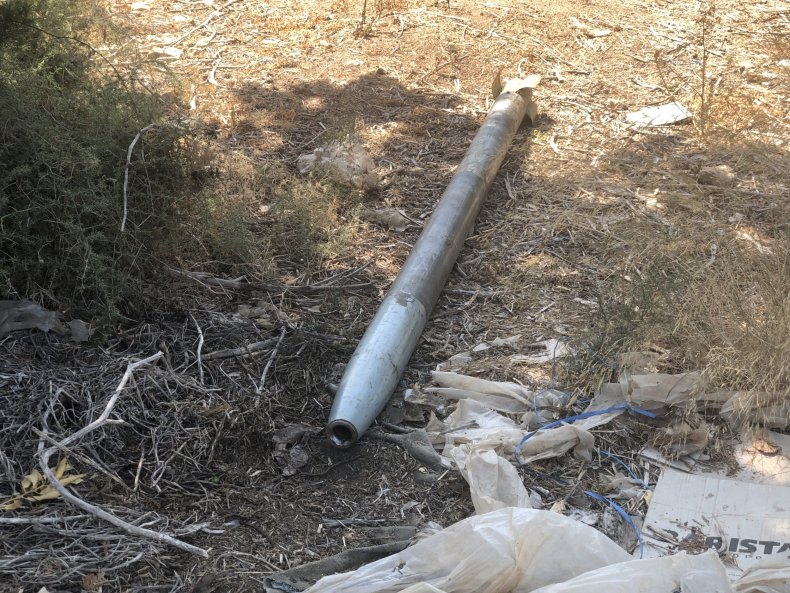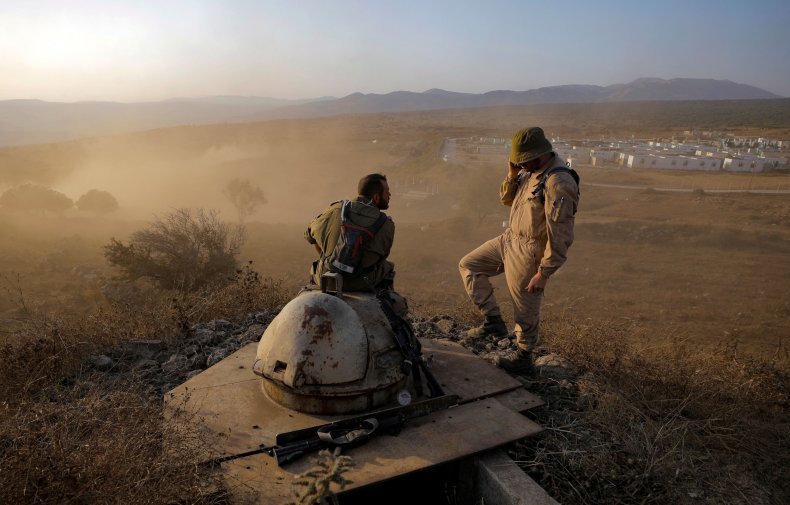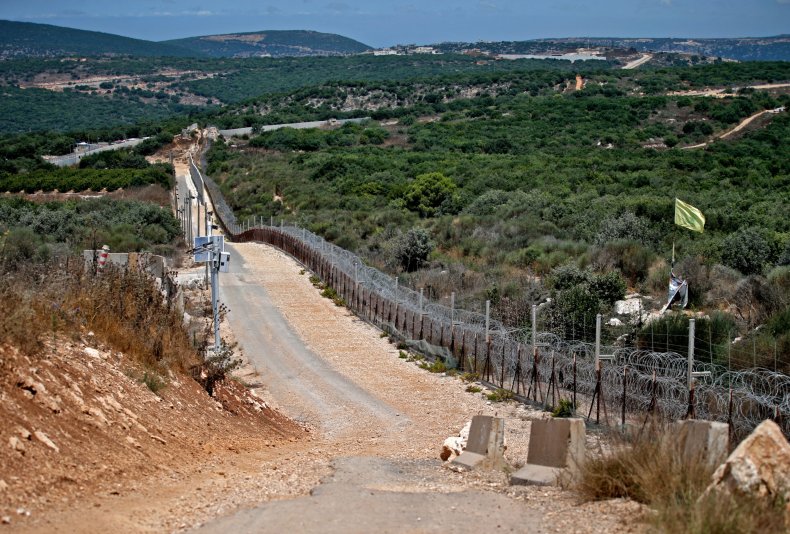The head of the Israeli military has threatened further retaliation to any additional attacks launched from across the northern border with Lebanon, while neighboring Syria has issued a warning to Israel after accusing it of recent airstrikes.
In remarks delivered Tuesday during a visit to Israel’s Northern Command, Israel Defense Forces (IDF) Chief of Staff Lieutenant General Aviv Kochavi spoke out in response to the launching of two rockets from Lebanese territory toward Israel’s Western Galilee region. The IDF said late Monday, early Tuesday local time, one rocket was intercepted by the Iron Dome Defense System, while the other landed in an open field.
The hostilities are the latest to rock the volatile border between Israel and Lebanon, which has undergone a severe economic decline owing to a financial crisis, the COVID-19 pandemic, and political paralysis among the country’s ruling class. Kovachi blamed the powerful Iran-backed Hezbollah movement for the dire situation Lebanon faced.
“Lebanon is in the process of collapsing—a collapse Hezbollah has helped cause,” Kovachi said. “But we do not intend to allow, as a result of this collapse, the rocket fire that happened this morning.”
He warned of retaliation seen and unseen.
“We will respond both overtly and covertly to any violation of Israeli sovereignty from Lebanon, whoever it may be,” Kovachi said.
Shortly after the rocket barrage across the border, the IDF said it conducted artillery fire on Lebanese territory.
The attacks from both sides of the border were confirmed to Newsweek at the time by the United Nations Interim Force in Lebanon (UNIFIL).
“Just before 4 a.m. this morning, UNIFIL radar detected the firing of rockets from an area north-west of Al Qulaylah toward Israel,” a UNIFIL spokesperson said. “Our radar subsequently detected return artillery fire by the IDF.”
The force, which is tasked with patrolling the restive border on behalf of the U.N., said it was working to prevent further escalation.
“UNIFIL is in direct contact with the parties to urge maximum restraint and avoid further escalation,” the spokesperson said. “Our liaison and coordination mechanisms are fully engaged. Together with the Lebanese Armed Forces, we have increased security in the area and have launched an investigation.”
The Lebanese Armed Forces’ Orientation Directorate later released a statement of their own regarding the series of events.
“On 07/20/2021, between the hours of 3.35 and 4.45, the area of Wadi Hamul, Tel Armiz, was bombarded by the Israeli enemy artillery. No casualties or damage were reported,” the statement said. “The area was targeted with 12 155-caliber artillery shells, against the background of the enemy’s allegations that two missiles fell in the occupied territories, originating from Lebanon.”
The Lebanese military then appeared to corroborate the Israeli and UNIFIL account with the discovery of a smoking gun: three devices designed to launch 122mm Grad rockets, one of which had yet to be launched and was subsequently disabled by army units.

A Grad rocket is seen after being discovered July 20 by the Lebanese Armed Forces near Al-Qaliyah, south of Tyre, amid reports of a rocket attack toward Israel and retaliatory Israeli artillery fire against Lebanon.LEBANESE MINISTRY OF INFORMATION
The official Lebanese National News agency also reported Tuesday that Lebanese soldiers had set up checkpoints along roads in the area to check vehicle registration and identity cards.
No nation, group or individual has claimed responsibility for the attacks, which are reminiscent of three similar rocket launches conducted in May amid a raging battle between Israeli forces and Palestinian factions led by the Hamas movement in Gaza. Pro-Palestinian protesters also stormed across the security fence from Lebanon, drawing IDF artillery fire that killed at least one person.
Later on Tuesday, the Lebanese Armed Forces also accused Israel of violating Lebanon’s airspace via an “enemy reconnaissance aircraft” that flew over the southern town of Naqoura.
State-run media recorded further incidents including the firing of a smoke bomb near a shepherd in the Barakat al-Naqar locality outside the town of Shebaa and the firing of weapons in Syria’s Golan Heights, which has been under Israeli control since 1967.
The Lebanese report noted that such activity in the Golan Heights often coincides with Israeli military drills, which the IDF conducted in the disputed region Tuesday.
Like Lebanon, Syria remains technically at war with Israel since 1948, when a coalition of Arab states first went to war over Israel’s establishment on territory also claimed by Palestinians.
Two more Arab-Israeli conflicts were fought in 1967 and 1971, and Israel fought another two conflicts in Lebanon itself, initially taking on Palestinian guerillas and Hezbollah, which remains active today across southern Lebanon.
While the Israel-Lebanon border remains tense, Israel has regularly conducted airstrikes in Syria, which was struck just hours before Tuesday’s rocket launches against Israel from Lebanon.
Asked for comment at the time, the IDF told Newsweek that “we do not comment on reports in the foreign media.”
The Syrian Defense Ministry, however, swiftly blamed the attack on Israel and said most of the incoming missiles were downed by anti-air defenses as they targeted Aleppo province’s Al-Safira region.
On Tuesday, the Syrian Foreign Ministry lashed out at Israel over its alleged involvement in the air raid, accusing the country of aiding militant groups such as the Islamic State and Nusra Front, violating international law, and disrespecting the Eid al-Adha Islamic holiday.
“The Syrian Arab Republic considers this aggression as an Israeli declaration of bankruptcy and a declaration of the defeat of the Western-Israeli subversive project,” the statement said, “and warns ‘Israel’ of the dangerous repercussions resulting from persisting in its attacks under false pretexts, and of its continuous support for armed terrorist organizations, and of its continued occupation of Arab lands, including in the occupied Syrian Golan.”
The ministry called on the U.N. Security Council “to assume its responsibilities within the framework of the United Nations Charter, the most important of which is to maintain international peace and security, to condemn and be held accountable for the blatant Israeli attacks, to take firm and immediate measures to prevent their recurrence and to oblige Israel to respect its resolutions, and to hold it accountable for its terrorism and crimes against the Syrian people.”
Israel has accused Syria of harboring Iran-backed forces setting up forward operating bases and transferring weapons throughout their stated mission of supporting Syrian President Bashar al-Assad in his decade-long civil war against rebels and jihadis.
Israel’s ally, the United States, is also active in Syria and has conducted airstrikes against suspected Iran-backed militias in response to rocket attacks against U.S. positions in Iraq. While Washington maintains a partnership with Baghdad, it has severed ties with Assad’s government in Damascus and instead works with a mostly Kurdish militia known as the Syrian Democratic Forces.
As for Lebanon, the U.S. has joined Israel in expressing frustration over the influence of Iran, Syria, and Hezbollah in the country.
On Tuesday, the White House extended a 14-year national emergency with respect to Lebanon “to deal with the unusual and extraordinary threat to the national security and foreign policy of the United States,” according to a statement that echoed past renewals.
This threat was blamed on “the actions of certain persons to undermine Lebanon’s legitimate and democratically elected government or democratic institutions; to contribute to the deliberate breakdown in the rule of law in Lebanon, including through politically motivated violence and intimidation; to reassert Syrian control or contribute to Syrian interference in Lebanon; or to infringe upon or undermine Lebanese sovereignty.”
“Such actions,” the statement asserted, “contribute to political and economic instability in that country and the region.
And the White House, like in prior years, took particular aim at Hezbollah and Iran.
“Certain ongoing activities, such as Iran’s continuing arms transfers to Hizballah — which include increasingly sophisticated weapons systems — serve to undermine Lebanese sovereignty, contribute to political and economic instability in the region, and continue to constitute an unusual and extraordinary threat to the national security and foreign policy of the United States,” the statement said.

Israeli soldiers take part in a military drill near Moshav Odem in the Israeli-annexed Golan Heights on July 20. Israel seized the territory from Syria in the 1967 Six-Day War and annexed it in a 1981 move not recognized internationally except for the U.S.JALAA MAREY/AFP/GETTY IMAGES
As Lebanon’s woes continued to mount, the country’s political plight took yet another apparent turn for the worse on Thursday when Prime Minister-designate Saad al-Hariri offered his resignation to President Michel Aoun. Hariri has twice before served as premier and ultimately resigned from his post both times.
U.S. Secretary of State Antony Blinken described Hariri’s latest decision to step down as “yet another disappointing development for the Lebanese people.”
“It is critical that a government committed and able to implement priority reforms be formed now,” the top U.S. diplomat said. “The government must also start preparing for the 2022 parliamentary elections, which should be held on time and conducted in a free and fair manner.”
Blinken issued an appeal to Lebanese leaders to overcome their differences for the common cause of salvaging the country.
“Lebanon’s political class has squandered the last nine months. The Lebanese economy is in free-fall, and the current government is not providing basic services in a reliable fashion,” he said. “Leaders in Beirut must urgently put aside partisan differences and form a government that serves the Lebanese people. That is what the people of Lebanon desperately need.”

A Hezbollah flag flutters on the Lebanese side of the border fence with Israel, near the northern Israeli settlement of Shtula on July 20. Israel shelled Lebanon early that same day in response to earlier rocket attacks, the Israeli army said, as the United Nations urged all sides to show “maximum restraint.”JALAA MAREY/AFP/GETTY IMAGES
[Disclaimer]









